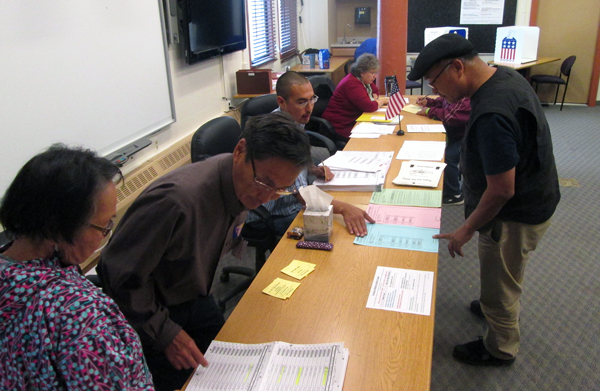
The state of Alaska is proposing several changes in how they deliver voting information to Alaska Natives whose first language is Yup’ik or Gwich’in.
The state is offering the changes after a federal judge issued a decision in a voting rights lawsuit last week. U.S. District Judge Sharon Gleason ordered the state to better help voters who speak Yup’ik and Gwich’in understand their ballots.
Elizabeth Bakalar is the lead attorney for the state on the case. She says that the state is focused on three areas:
“That voters need better information ahead of the election that language assistance is available, that outreach workers need to be better prepared to provide language assistance voters especially prior to election day and to better address certain dialectical differences. So those are the three areas which the interim remedies we’re proposing are meant to target and certainly any long term remedies would probably target those areas as well.”
Bakalar explains, the state is preparing different versions of ballot language to send to tribal councils and outreach workers to reflect different dialects. She says they’re looking for feedback from speakers.
“Send copies of the different the Central Yup’ik ballot to the tribal councils from the Bethel Census area to the Dillingham and Wade Hampton Census areas and prepare different versions of ballot measure language to send to tribal councils and outreach workers and get input form the plaintiffs on potential dialect differences on the dialect differences in the ballot measures.”
Oscar Alexie teaches Central Yup’ik at the UAF Kuskokwim campus in Bethel and has also worked on Yup’ik translations of ballot materials for the state.
He says that most bureaucratic language used to explain ballot measures and other choices on ballots, simply does not exist in Yup’ik. In addition there are several regional dialects of Yup’ik, which lack the specificity needed, making ballot translation next to impossible.
Alexie says the best situation would be to have translators from each community reading the ballot to Yup’ik speaking voters, because Yup’ik was only recently codified in the last generation or so, so most people will understand best, if they hear the translations, rather than read them.
“We translated the materials where it could be read to voters. And hopefully it would have people at the polling places that can read in an understandable voice, not make it sound like they’re reading but talking to someone in the Yup’ik language and follow along and understand it.”
state already provides that service and will be doing more to promote it’s availability under their plan. Alexie says he worries about The possible negative impacts of the lawsuit on language translation in the state. He makes his point by comparing the division of elections and their translators to a dog team. He says you can expect a lot from a dog, they’re hard workers and they like to pull but they can only do so much, especially in the short period of time leading up to the November election.
“Growing up I remember my brother in-law saying … nuf-tut, they break – a dog if you ran it beyond its limitations and not giving it some rest between they’ll be a point where the dog breaks and will never pull again.”
The state of Alaska and their translators will be moving quickly, they want to have the changes made in time for the November election. The plaintiffs, Alaska native speakers from Southwestern and interior Alaska, being represented attorneys from the Native American Rights Fund, have until Wednesday to respond. Then Judge Gleason will issue an order telling the state what they need to do.
Judge Gleason has not yet ruled on whether the state intentionally violated voter’s rights on the basis race or color.
Daysha Eaton is a contributor with the Alaska Public Radio Network.
Daysha Eaton holds a B.A. from Evergreen State College, and a M.A. from the University of Southern California. Daysha got her start in radio at Seattle public radio stations, KPLU and KUOW. Before coming to KBBI, she was the News Director at KYUK in Bethel. She has also worked as the Southcentral Reporter for KSKA in Anchorage.
Daysha's work has appeared on NPR's "Morning Edition" and "All Things Considered", PRI's "The World" and "National Native News". She's happy to take assignments, and to get news tips, which are best sent via email.
Daysha became a journalist because she believes in the power of storytelling. Stories connect us and they help us make sense of our world. They shed light on injustice and they comfort us in troubled times. She got into public broadcasting because it seems to fulfill the intention of the 4th Estate and to most effectively apply the freedom of the press granted to us through the Constitution. She feels that public radio has a special way of moving people emotionally through sound, taking them to remote places, introducing them to people they would not otherwise meet and compelling them to think about issues they might ordinarily overlook.




